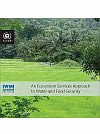 According to the authors of New Research at World Water Week in Stockholm, a radical transformation in the way farming and natural systems interact could simultaneously boost food production and protect the environment—two goals that often have been at odds. Research excerpts are below: "The authors warn, however, that the world must act quickly if the goal is to save the Earth’s main breadbasket areas—where resources are so depleted the situation threatens to decimate global supplies of fresh water and cripple agricultural systems worldwide. A new analysis resulting from the joined forces of the International Water Management Institute (IWMI) and the United Nations Environment Programme (UNEP) outlines the urgent need to rethink current strategies for intensifying agriculture, given that food production already accounts for 70 to 90 percent of withdrawals from available water resources in some areas. The report, An Ecosystem Services Approach to Water and Food Security, finds that in many breadbaskets, including the plains of northern China, India’s Punjab and the Western United States, water limits are close to being “reached or breached.” Meanwhile, 1.6 billion people already live under conditions of water scarcity, and the report warns that number could soon grow to 2 billion. The current situation in the Horn of Africa is a timely reminder of just how vulnerable to famine some regions are. Examples of Successful Integration in the Field UNEP and IWMI and collaborators have identified multiple opportunities to use trees on dryland farms that will intensify the amount of food produced per hectare of land area while helping to improve the surrounding ecosystem. They note that by integrating trees and hedgerows, farmers can prevent runoff and soil erosion and retain more water for nourishing their crops. Another example of innovative thinking includes better water and soil management in rainfed systems in sub-Saharan Africa, which have demonstrated the ability to reverse land degradation while at the same time increasing crop yields by twofold or threefold. Overall, the authors say it’s time for decision-makers at the international, national and local level to embrace an agroecosystem approach to food production. These changes could include providing more farmers with incentives to adopt improved practices through ‘payments for environmental services (PES)’. One example being explored by the CGIAR’s Challenge Program on Water and Food (CPWF) is the potential for benefit sharing in river basin areas of Peru, Ecuador and Colombia. Upstream users value the water for irrigation and ecotourism and also have a spiritual affiliation with the ecosystem. The hydropower companies need a steady stream to support electrification of the growing urban population downstream. Large-scale farms and agro-industry also need increasing supplies of water“ More and more agriculture needs to be brought into the ‘green economy’,” said Alain Vidal of the CPWF. “We need to value farming practices that protect our precious water resources in the same way we are beginning to value forest management that helps reduce greenhouse gas emissions, especially because those natural resources support the livelihoods of the most vulnerable.” In the report, An Ecosystem Services Approach to Water and Food Security, experts from UNEP, IWMI and 19 other organizations acknowledge that one major impediment to adopting a more sustainable approach to food production is that it requires a new level of cooperation and coordination among officials and organizations involved in agriculture, environmental issues, water management, forestry, fisheries and wildlife management—individuals and groups who routinely operate in separated, disconnected worlds. “It is essential that in the future we do things differently. There is a need for a seminal shift in the way modern societies view water and ecosystems and the way we, people, interact with them,” said David Molden. “Managing water for food and ecosystems will bring great benefits, but there is no escaping the urgency of this situation. We are heading for disaster if we don’t change our practices from business as usual.” Comments are closed.
|


